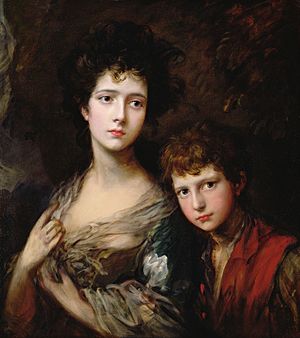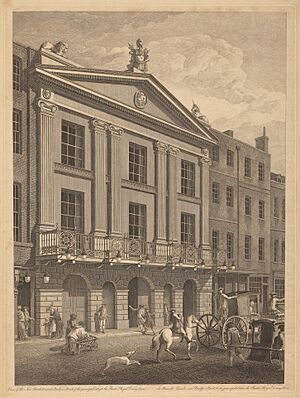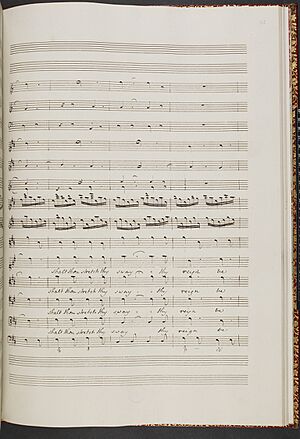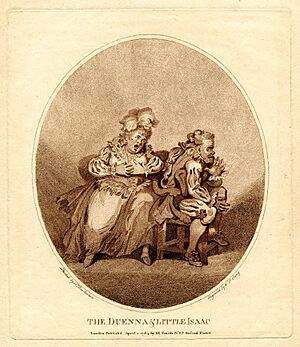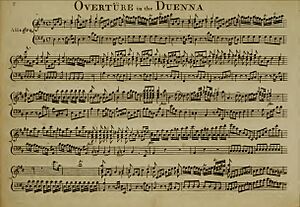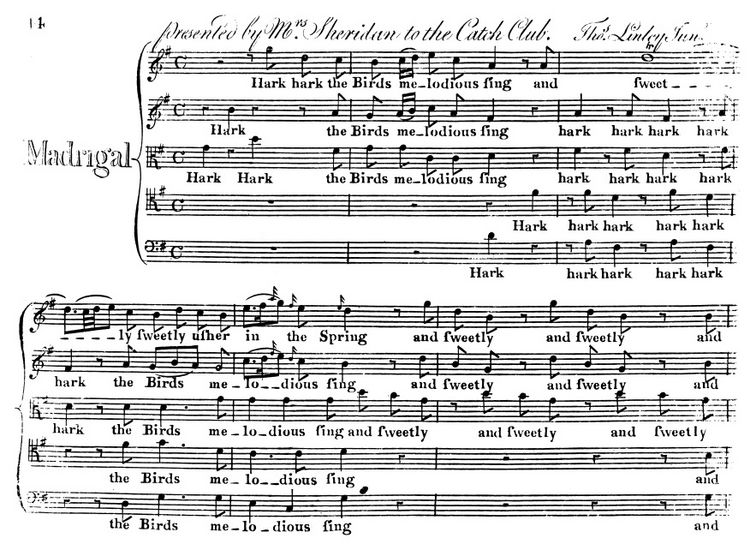Thomas Linley the younger facts for kids
Quick facts for kids
Thomas Linley
|
|
|---|---|
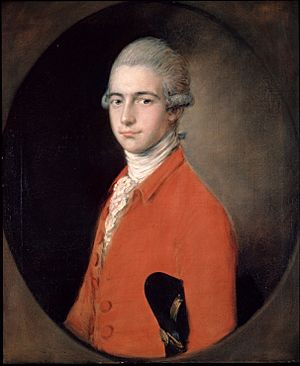
Tom Linley, by Gainsborough (around 1771)
|
|
| Born | 7 May 1756 Abbey Green, Bath
|
| Died | 5 August 1778 (aged 22) Grimsthorpe Castle, Lincolnshire
|
| Resting place | unknown |
| Nationality | English, British |
| Occupation |
|
| Parent(s) | Thomas Linley Mary Johnson |
| Relatives | Elizabeth Ann (sister) Mary (sister) Samuel (brother) Maria (sister) Ozias Thurston (brother) Jane (sister) William (brother) |
Thomas Linley the younger (born May 7, 1756 – died August 5, 1778), also known as Thomas Linley Junior or Tom Linley, was a very talented English composer and violinist. He was the oldest son of the famous composer Thomas Linley. Many people thought Tom Linley was one of the most promising English musicians of his time. Some even called him the "English Mozart" because of his amazing skills. Sadly, his bright future ended too soon when he drowned in a boating accident at just 22 years old.
Contents
Early Life and Musical Beginnings
In the late 1700s, Bath was a very popular city in England, second only to London. The Linley family was the most important musical family in Bath. They started from humble beginnings in Gloucestershire. Tom's grandfather was a carpenter. But the family became well-known artists, providing music for the rich people in Bath. A famous writer, Charles Burney, once called them "a Nest of Nightingales."
Tom's father, Thomas Linley the elder, taught music and singing. He started managing concerts at the Assembly rooms in Bath in 1766. Later, in 1771, he became the musical director of the New Bath Assembly Rooms. He made sure his children, including Tom, learned music. They started performing very young. By 1763, Tom and his siblings were playing to full houses. Their talents helped the family become more successful and respected.
Tom had several talented siblings. His sisters – Elizabeth Ann, Mary, and Maria – were great singers and actresses. His brother Samuel was a skilled oboe player before he became a sailor. His youngest brother, William, also became a musician and composer.
Tom showed his musical gifts very early. He played a violin concerto in Bristol on July 29, 1763, when he was only seven years old! The Bath Journal newspaper advertised his performance. It said he was a "child of seven years old" who would play a violin concerto.
Soon after, Tom started composing his own music. William Boyce, who was the King's main musician at the time, became his teacher. Tom studied with him from 1763 to 1768. As Tom and his siblings became more famous, their father asked for higher fees. They performed in many places, including London, often in charity concerts.
In 1767, Tom performed at Covent Garden with his sister Elizabeth. He sang the part of Puck, danced, and played the violin in a show called The Fairy Favour. People were amazed by his performance. The Lloyds Evening Post newspaper wrote that his singing, violin playing, and dancing were "beyond expectation."
In May 1768, the famous painter Thomas Gainsborough wrote in a letter that "Tommy Linley [was] bound for Italy at the first opportunity."
Journey to Italy and Meeting Mozart
Between 1768 and 1771, Tom traveled to Italy to continue his music studies. He learned violin and composition from Pietro Nardini in Florence. Years later, Nardini still spoke fondly of Tom, saying he had "powerful abilities."
In Florence, Tom met another young musical genius, Wolfgang Amadeus Mozart, in April 1770. Both boys were 14 years old. They quickly became close friends, making and playing music together. Charles Burney, a music historian, wrote that "The Tommasino, as he is called, and the little Mozart, are talked of all over Italy as the most promising geniuses of this age."
Their friendship was so strong that when Mozart had to leave Florence for Rome, it was a sad moment for both of them. Robert Gutman, a writer, explained that "a melancholy Thomas follow[ed] the Mozarts' coach as they departed." They never saw each other again.
Leopold Mozart, Wolfgang's father, wrote about Tom in a letter. He called Tom "a very dear boy... who plays beautifully." He described how the two boys played music together for hours, hugging each other. When it was time for the Mozarts to leave, Tom cried and gave Wolfgang a poem. He then walked with their coach to the city gate. Leopold wished his daughter could have seen the emotional goodbye.
It is said that Tom kept a letter he received from Mozart for the rest of his life.
A Rising Star: Musician and Composer
When Tom returned from Italy in 1771, he was recognized as one of Britain's best violin players. He quickly became a leading figure in London's music scene. The Bath Chronicle and Weekly Gazette called him "one of the most important players on the violin in this kingdom." Matthew Cooke, a composer and friend, wrote that Tom was "indefatigable" (meaning he never got tired) and "one of the most eminent Violin Performers of the age."
In 1773, one of Tom's cantatas (a type of vocal music), "In Yonder Grove," was performed. His sister Elizabeth and brother Samuel sang in it. That same year, he became a leader at the Drury Lane Theatre in London, where he worked until his death. He often played violin concertos between acts of operas.
Also in 1773, Tom composed his first major work, an ode called Let God arise. It was for the Three Choirs Festival in Worcester. This piece was performed again in 1775. An advertisement for the festival showed that Tom, who was only 19, was considered one of the greatest composers. His music was played alongside famous works by Handel and Giardini.
Tom continued to perform with his father in Bath and London. He also sometimes "led the band," meaning he was the main violinist, as noted by the Bath Chronicle and Weekly Gazette in 1776.
The Duenna: A Big Success
One of Tom's most famous works was the music for The Duenna or the Double Elopement. This was a play written by Sheridan. Tom composed most of the music, including the overture. He also arranged and adapted other popular songs and tunes. His father also contributed some music.
The Duenna opened in November 1775 and was a huge success! It was performed 75 times in its first season. Even Samuel Johnson, a famous writer, called it one of the best comedies of his time. King George III and his family watched it many times. The play was so popular that it stayed on stage across Britain for over 60 years.
Later Works and Musical Style
After The Duenna, Tom's works became even grander. In 1776, he wrote his Shakespeare Ode, also known as Ode on the Witches, Fairies and Aerial Beings of Shakespeare. A newspaper called The Morning Post praised it highly. It said the music showed "extraordinary effort of genius in so young a man." It also noted that his music had "brilliancy and warmth of invention."
Matthew Cooke wrote that by 1776, Tom Linley had composed "no less than Twenty Concertos for the violin." Many of these were performed by him and received "unbounded applause."
In 1777, he composed what many consider his best work: an oratorio about the crossing of the Red Sea, called The Song of Moses. It was performed again in 1778.
Tom also wrote new music for Sheridan's play The Tempest in 1777. His Storm Chorus for the play was called "one of the most remarkable achievements in English music." This music was performed in London for about 40 years after Tom's death.
His last stage work, The Cady of Bagdad (1778), was not as successful as The Duenna.
Musical Style: What Made His Music Special?
Tom Linley's music was typical of English composers of his time, but it was also very unique for someone so young. Many of his compositions were lost, especially in the Drury Lane Fire of 1809. However, the music that survived shows his "fluent and congenial melody, his contrapuntal facility, and his imaginative orchestration." This means his music had smooth, pleasant tunes, complex musical patterns, and creative use of instruments.
Like other English composers, Tom was influenced by Handel, especially in his choral works. But Tom's choral music also had its own strength and inventiveness. He was only about 15 when he composed the amazing double-fugue "Wonderful Art Thou." A musician named Peter Holman said that Tom's music in The Song of Moses has "a grandeur and sweep that makes its subsequent neglect hard to understand."
His vocal music and its orchestration (how instruments are used) were very creative. They were influenced by Johann Christian Bach and Arne, but Tom added his own fresh ideas. For example, in his cantatas, he used instruments like the oboe and French horn in a special way. They would play along with the singers' voices or add poetic sounds to the music.
His stage works also showed great skill. He could make the characters' feelings stronger through his music. The music for The Duenna, even though it was written quickly, was a main reason for its success.
Tom's only surviving violin concerto was probably written after his trip to Italy. It shows the popular Italian style of the time. But Tom also made it unique. He combined very difficult parts for the solo violinist with simple, quiet moments. His use of instruments and harmonies also made his concerto special.
His only surviving violin sonata also proves his amazing skill on the instrument. It has extremely difficult parts, like playing very high notes and fast arpeggios. It's a show-off piece, even though it follows a sonata form.
In his last major work, The Cady of Bagdad, Tom experimented more with brass and wind instruments. Conductor Peter Leech wondered what amazing music Tom would have created if he had lived longer.
The Music to The Duenna
Creating the comic opera The Duenna was not easy. Comic operas were not very popular at the time. However, Sheridan's previous play, The Rivals, had been a huge hit. So, people thought a new comedy by him, with music added, would also be successful.
Sheridan first wanted his father-in-law, Thomas Linley Sr., to write the music. But Linley Sr. was not very excited. He doubted the opera would succeed. Also, Sheridan only gave him small parts of the play to set to music, not the whole story. This was probably because the play was similar to Sheridan's own secret marriage to Linley Sr.'s daughter, Elizabeth. Linley Sr. also wanted to focus on other musical projects.
As the opening night got closer, not much music was ready. So, Linley Sr. asked his son, Tom Linley, to help. Tom ended up writing about a third of the music for The Duenna. He also arranged and edited folk songs and other songs chosen by Sheridan and Elizabeth. His father contributed about a quarter of the music. Even though Tom's songs were written quickly, they were beautiful and helped make The Duenna a success by making the characters more real.
Linley Sr. eventually went to London to help with rehearsals. But he "insisted for the Linley name not to be associated with the opera." Some think he didn't like how the music was put together. But the play's story, which was so similar to his daughter's elopement, might have been the real reason.
Today, finding the complete music for The Duenna is difficult. Many parts are missing or only exist in simple versions. However, some of Tom Linley's full scores have survived, thanks to a special edition of his works published after his death.
The table below shows who composed or arranged the music for each part of The Duenna:
- Color key
|
* Tom Linley Jr (composed by)
|
* Thomas Linley Sr (composed by)
|
* Other composers (arranger uncertain)
|
| Act | Title | Composer | Character(s) |
|---|---|---|---|
| Overture | Tom Linley Jr | ||
| Act I | Serenade "Tell me my lute" | Tom Linley Jr | Antonio |
| Act I | "The Crimson Morn" | Thomas Linley Sr | Antonio |
| Act I | Trio: "What vagabonds"/"Adieu Antonio" | Thomas Linley Sr | Don Jerome, Antonio, Louisa |
| Act I | "Could I each fault remember" | Tom Linley Jr | Ferdinand |
| Act I | "I could never lustre see" | Thomas Linley Sr | Antonio |
| Act I | "Friendship is the bound of reason" | Tom Linley Jr | Antonio |
| Act I | "Tho' cause for suspicion appear" | William Jackson | Ferdinand |
| Act I | "Thou can'st not boast" | Thomas Linley Sr | Louisa |
| Act I | "If a daughter you have" | Scottish air | Don Jerome |
| Act I | "When sable night" | Scottish or English air | Clara |
| Act I | "Had I a heart" | Irish air ("The harp that once") | Don Jerome |
| Act I | "My mistress expects me" | Tom Linley Jr | Isaac, Louisa |
| Act I | "Gentle maid" | Tom Linley Jr | Don Carlos |
| Act I | Trio: "May'st thou never happy be" | Tom Linley Jr | Louisa, Don Carlos, Isaac |
| Act II | "Give Isaac the nymph" | Thomas Linley Sr | Isaac |
| Act II | "When the maid" | Thomas Linley Sr | Don Jerome |
| Act II | "When a tender maid" | Galliard | Duenna |
| Act II | "Ah, sure a pair was never seen" | Michael Arne | Don Carlos |
| Act II | Duet "Believe me good sir" | John Travers | Isaac, Don Jerome |
| Act II | "A bumper of good liquor" | Thomas Linley Sr | Ferdinand, Isaac, Don Jerome |
| Act II | "What bard O Time discover" | Tommaso Giordani | Louisa |
| Act II | "O had my love ne'er smiled on me" | Scottish air | Don Carlos |
| Act II | Trio: "Soft pity never leaves" | William Hayes | Louisa, Don Carlos, Antonio |
| Act III | "O the days when I was young" | Thomas Linley Sr | Don Jerome |
| Act III | "Ah cruel maid" | William Jackson | Ferdinand |
| Act III | "Shall not my soul" & "Sharp is th woe" | Tom Linley Jr | Ferdinand |
| Act III | "By him we love offended" | Venanzio Rauzzini | Clara |
| Act III | "How oft, Louisa, hast thou said" | Scottish air | Antonio |
| Act III | "Adieu thou dreary pile" | Antonio Sacchini | Clara |
| Act III | Friars' Glee: "This bottle's the sun of our table" | Thomas Linley Sr | Friar Paul, Masquerader |
| Act III | Duet:"Turn thee round, I pray thee" | Tom Linley Jr | Louisa, Clara |
| Act III | "Oft does Hymen smile to hear" | Francesco Geminiani | Ferdinand, Antonio, Louisa, Clara |
| Act III | Finale | Thomas Morley ("Now is the month of Maying") | Don Jerome, Louisa, Ferdinand, Clara, Antonio |
What Music Did Thomas Linley Write?
Stage Works
| The Duenna (comic opera). 1775. (Includes the overture, songs, and other musical pieces.) |
| The Tempest (music for Shakespeare's play). 1777. (Includes Ariel's first song, "Come Unto These Yellow Sands," "Hark, hark, the watch-dogs bark," and the famous Storm chorus.) |
| The Cady of Bagdad (comic opera). 1778. |
| The Triumph of Mirth, or Harlequin's Wedding (pantomime). Performed after Tom's death in 1782. (Includes the overture.) |
Other Vocal Works
| Let God arise (anthem, based on Psalm 68). 1773. |
| A Lyric Ode (also known as The Shakespeare Ode). 1776. |
| The Song of Moses (oratorio, based on the Bible's Exodus). 1777. |
| Verses to the Memory of Garrick (music for a poem about actor David Garrick). |
About 13 cantatas, madrigals, glees, elegies, and songs. These were published in a collection after his death.
|
Instrumental Works
| 6 violin sonatas, 1768. (Most are lost, only one in A major survived.) |
| About 20 violin concertos composed by 1775. Only the violin concerto in F major is complete. |
How Did Thomas Linley Die?
Tom was visiting the Duke of Ancaster at Grimsthorpe Castle in Lincolnshire. He was with his sister Mary and a friend. On August 5, 1778, he drowned in a boating accident. He was just 22 years old.
Newspapers at the time reported his death. His funeral was held at Edenham parish church. There is a plaque in the church in his memory. However, records suggest he might not have been buried there. Some say his body was taken to Bath for burial.
Tom's death was a great shock to everyone. It was seen as a tragedy for both his family and for English music. King George III even ordered a special collection of his works to be published.
The Irish singer Michael Kelly later met Mozart in Vienna. Mozart spoke about Tom Linley with great sadness. He said that Tom was a "true genius" and that if he had lived, he would have been "one of the greatest ornaments of the musical world."
Where Can You Hear His Music?
Even though Tom Linley's music is amazing, it's not widely known today. However, there are a few recordings available, mostly from the British classical music label Hyperion.
- A Lyric Ode on the Fairies, Aerial Beings and Witches of Shakespeare (Helios, 2005)
- Cantatas & Theatre Music (Includes Music for The Tempest, Overture to The Duenna, and three cantatas) (Helios, 2006)
- The Song of Moses & Let God arise (Helios, 2008)
- His Violin Sonata in A major is on English 18th-century Violin Sonatas (Hyperion, 1992)
- His Violin Concerto in F major is on English Classical Violin Concertos (Helios, 2008) and Mozart in Italien (Oehms Classics, 2010)
See also
 In Spanish: Thomas Linley (hijo) para niños
In Spanish: Thomas Linley (hijo) para niños


